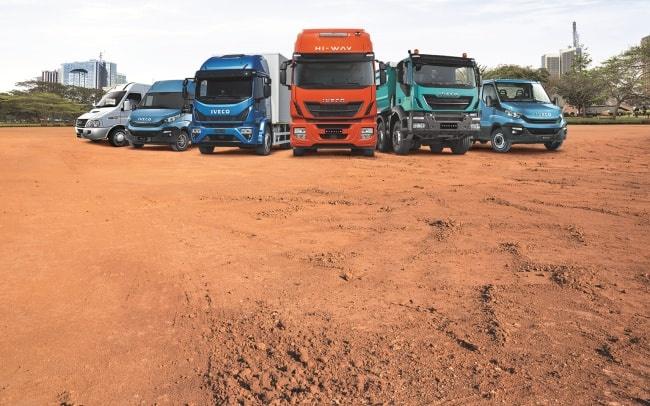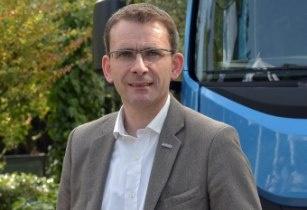Continued investment in developing local assembly capabilities and strengthening distribution networks are testament to Iveco’s commitment to bringing an extensive product offering to Africa
Following the good news of Iveco signing an agreement with its partner, the Moroccan Premium Group, to provide 105 waste management vehicles in the Côte d’Ivoire, Sylvain Blaise from Iveco Bus, catches up with Pierre Lahutte, Brand President Iveco about the company’s plans for the region and developments in 2018.
How do you see the market situation in Africa?
PL: 2016 and 2017 have been critical years, mostly due to oil prices and inflation, which have put on hold imports in major markets, such as Algeria, Nigeria and Angola. Other major markets have slowed down because of the ongoing conflicts, which are draining currency away from industrial and construction activities. That said, the market has never really stopped, and countries such as Morocco and Tunisia have continued to grow. In the last months of 2017, with the increase in the price of oil, we have begun to see the first positive signs and we can expect a better trend in 2018.
What are the main values of Iveco in Africa?
PL: First of all, we have the widest offer in the market, which ranges from light commercial vehicles to heavy trucks and personalised solutions. We are able to meet the specific requirements of transport operators in a wide variety of industries.
Even better, we have multi-award winning products in every single segment of our offering, and this is an invaluable guarantee of performance and quality for our customers.
In the Light Commercial Vehicle segment we offer the Daily, which has been recently been crowned International Van of the Year 2018 – and this is just the latest in a long string of awards won by this product family.
In the medium range, the Eurocargo, which won the title of Truck of the Year 2016, is known as the truck the city likes and the ideal partner in urban missions, thanks to the advanced features that optimise efficiency, manoeuvrability and sustainability.
In the heavy line, we offer both on- and off-road ranges covering a wide variety of missions: the Stralis, which includes models designed for missions ranging from regional to international long-haul transport; the Trakker range for the quarry and construction industries, and the Astra HD9 covering the heavy offroad missions in caves and mining.
Iveco has deep roots that date back to more than 150 years ago and bring together some of the most important brands that have made the history of transport in Europe. These brands include Fiat (Italy), UNIC (France), Magirus (Germany) and Pegaso (Spain) – brands which have a strong reputation in Africa, where they have built a well-established presence over the years, giving Iveco a unique heritage across the continent. Our long-term commitment to Africa, which dates back to the beginning of industrialisation in the region, has enabled us to create the widespread network of professional dealers we have today to support our customers in most African countries.
However, we are constantly working on further strengthening our network and ensuring we have the facilities we need to match the evolving requirements of the markets. Most recently, we established a new partnership with the Moroccan Premium Group to serve the West African markets, and we appointed a new dealer in Kenya. We are also installing assembly plants in several parts of the continent to be closer to our customers. We assemble right-hand drive vehicles and buses with our South African joint venture to serve the sub-Saharan countries that require this type of vehicle. Last year we opened new plants with local partners in Tunisia, Algeria and Kenya, and this year we will start an assembly plant in Ethiopia with our joint venture partner.
What are the most significant moments for Iveco in 2018?
PL: In 2018 we will launch the Stralis X-WAY. It is a truck that combines the on-road excellence of the Stralis together with the legendary off-road robustness of the Trakker. This will be the key moment of the year combined with widespread local action at the start of a local assembly plant in Ethiopia and an extension of a Eurocargo assembly plant in Algeria.
Can you give us further examples of your commitment to the region?
PL: Our continued investments in developing our local assembly capabilities and, very importantly, in strengthening our distribution network are testament to our commitment to the region. They enable us to bring customers across Africa all the benefits of our extensive product offering, together with the effective support we provide in partnership with our dealer network. And the markets recognize our commitment and the quality of our offer, as shown by the important contracts we close in the region.
The most recent contracts are the two major supply agreements in Côte d’Ivoire. The first one is to provide 105 units consisting of 30 light duty Daily vehicles, 21 medium duty Eurocargo trucks and 54 heavy-duty Trakker trucks. The vehicles, which will be supported by our partner Premium Group, are destined for waste management operations in the city of Abidjan and surrounding areas, serving a population of some 1.7 million.
The second supply agreement is for the delivery of 450 Iveco buses to the public transport provider for the city of Abidjan. Iveco Bus will provide 400 Crossway Low Entry buses and 50 Crealis city buses powered by Compressed Natural Gas (CNG) engines.
Designed for heavy traffic routes, the High Quality Mass Transit Bus System provides improved service and comfort to passengers in a modern and welcoming interior. The main objective of this transport system is to encourage mobility and modal shift, while optimising costs. A Crealis line is less expensive than a tram line with equal passenger capacity, because it is faster to implement. Furthermore, this transport system is subject to an easy deployment and progressive development regarding budget and project phases. In addition, Crealis has been developed with accessibility for everyone in mind, with one-step access and an all-flat floor that facilitates a better flow of passengers entering and exiting the vehicle and improves accessibility for persons with reduced mobility.
This second agreement is also testament to Iveco’s commitment to sustainability, and in particular to supporting the transition to natural gas as an alternative fuel in transport. In fact, Iveco was the first manufacturer in the industry to understand the potential of natural gas as a sustainable fuel and we have pioneered this technology for more than 20 years. We believe that the transport industry has a role to play in the fight against climate change and greenhouse gas emissions. Natural gas has proven to be a mature solution that is available today at mass-market level, providing a bridge to zero emission mobility, and we are at the forefront of this alternative traction technology. In fact, Iveco is the first to offer a full range of natural gas models, from light vehicles to heavy vehicles and buses, ready to support transport operators and municipalities as their partner for sustainable transport.
Africa has large natural gas resources that can be harnessed to develop sustainable transport systems, bringing all the benefits of this technology to its cities and transport operators. Compressed Natural Gas offers an immediate solution to reduce the environmental impact of their activities in countries where emission standards are much less stringent than in regions such as Europe. In fact, the quality of diesel in many African countries hinders the use of engine technologies in categories above Euro 3, with a consequent impact on the environment. This issue does not apply to CNG technology, because the quality of natural gas is similar in all African countries, so all countries can enjoy the full benefits of this solution: low noise levels, high efficiency and low CO 2 emissions. In fact, CNG is generally methane, which produces more energy than other hydrocarbon fuels due to its relatively high hydrogen content and lower CO2 emissions because of its low carbon content. These are the benefits that Abidjan will enjoy with the Iveco Bus CNG-powered Crealis.






















